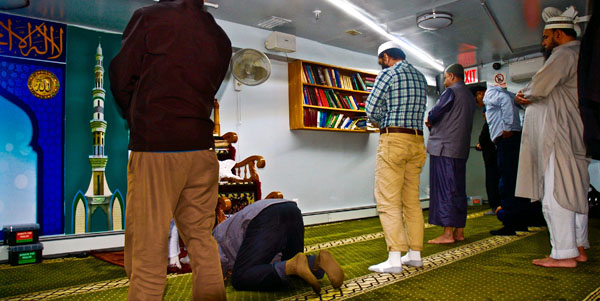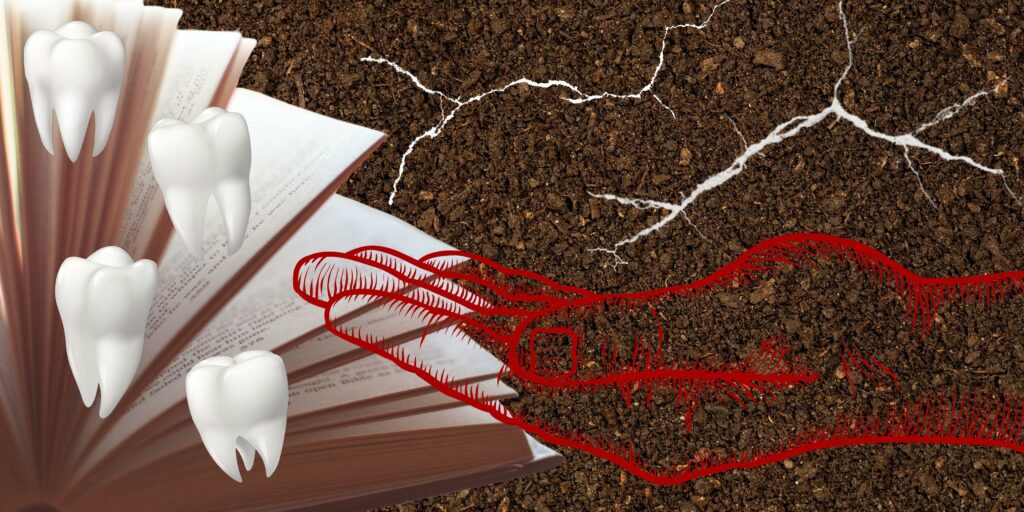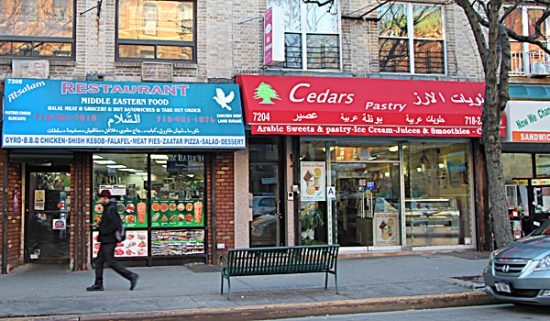An Oral History of New York’s Arab and Muslim Community After 9/11
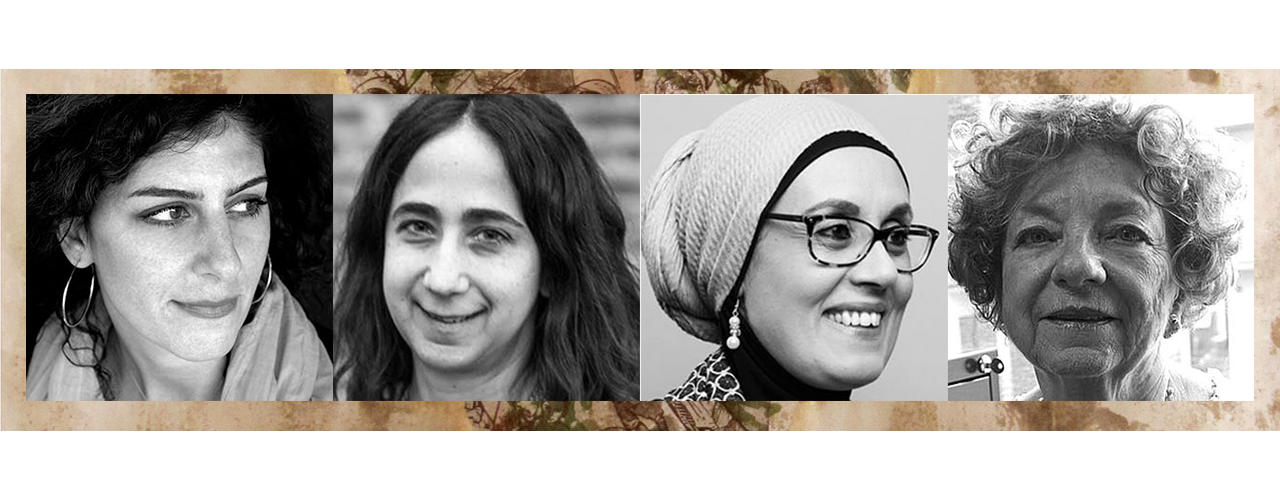
September 17, 2021
When I set out to write this piece, I was interested in interviewing the wrongfully detained. Over 700 Arab and Muslim men were arrested in New York and New Jersey alone after the attacks on September 11, 2001. None of them had any connection to Al Qaeda, but the U.S. government nonetheless removed them from their communities for prolonged periods of time. Some were deported. Most were not afforded the opportunity to bid their families farewell, or even to learn where they were going.
I spent months trying to track them down, jotting down phone numbers with area codes from Brooklyn to Pakistan. I didn’t have much luck. While I was able to identify a number of individuals, none of them ultimately agreed to talk to me. One agreed to speak anonymously, but only through a family friend. Another set up a meeting with me, only to not show up when the time came. Most of the men I contacted simply wanted nothing to do with this story.
The reason for their disinterest was clear: the experience of arrest, of detention, of solitary confinement, of leaving for work and never coming home again, had left deep scars. Why go back there?
There came a moment in the reporting process where I lost the taste for going after these stories. I was uninterested in cataloguing the trauma of individuals who want nothing more than to move on. Instead, I wondered: How else I might shed light on the experiences of Arab and Muslim New Yorkers since the turn of the millenium? What was it like on the ground in those early months and years? What was the community doing to mobilize, to shield itself from the backlash? Why do the memories of those experiences matter now, 20 years later?
Instead of posing these questions to former detainees, I reached out to individuals in their orbits, people who were working on the ground in New York City after the attacks, providing important support services to the Arab and Muslim community here. While I interviewed many people over the course of the summer, I condensed this piece into an oral history of four women whose stories braided seamlessly and complemented one another. I would like to thank them and every other person who took the time to speak with me. If nothing else, let this piece be a reminder that their voices and stories matter.
* Trigger Warning: This article contains descriptions of violence that some readers may find disturbing.
Note: Section titles and text in italics were inserted by the author. All other text was directly transcribed from interviews.
A Clear Blue Sky
Debbie Almontaser
School teacher and community organizer
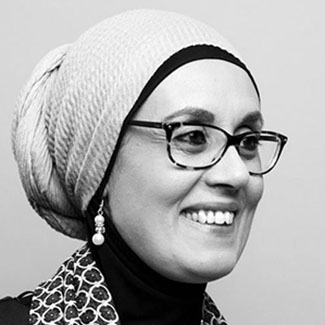
It’s hard to talk about. You know, that day I was actually teaching at PS 261 [in Brooklyn]. It was a beautiful, clear blue sky, and it was only the second or third day of school. I went down to pick up my students from the schoolyard and I just remember breathing in that fresh, crisp, clean air. And then simply saying, “Okay, folks, we’re gonna have a great day.”
Emily Jacir
Artist, community activist and educator
In the weeks before 9/11, I was in Bethlehem, living through the first of the major Israeli invasions of that period. So, you know, we would be up all night, and there was shelling, and there were tanks rolling through Bethlehem. And then I left to go to New York, and I literally landed on September 10. I went to bed that night, and there was a terrible thunderstorm. And I really remember that thunderstorm because I kept waking up thinking it was Israeli shelling. The next morning, I was up super early because I had jet lag, and the sky was really blue. And I was like, “Okay, I gotta get up, I gotta tell everybody what’s happening in Palestine.”
Rachel Meeropol
Lawyer at the Center for Constitutional Rights
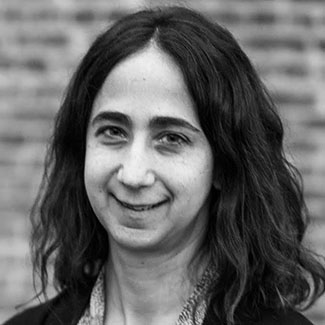
On 9/10, I flew [from New York] to Alabama to do a semester-long clinic of death penalty defense work. I think 12 of us from NYU all went to Alabama on 9/10. And 9/11 was the first day of our clinic. So you know, we had moved into these apartments in Montgomery, and we were about to go into the Equal Justice Initiative office to do some planning for the following day, when we were going to be interviewing our clients on death row for the first time.
Debbie Almontaser
The kids were doing the math problem of the day. And as I was sitting there with the students, a parent came to the door and said “I need to talk to you.”
We stepped outside and she told me that one of the buildings was accidentally hit by a plane.
She said, “I’ll keep you updated.”
Half an hour later, maybe more, she came back again. I thought she was going to tell me it was an accident, everything was fine. She then tells me the second tower was hit. And at that point, my stomach just dropped.
And the first thought that I had was, “Oh, my God, I hope it is not Muslims, people calling themselves Muslims.”
Emily Jacir
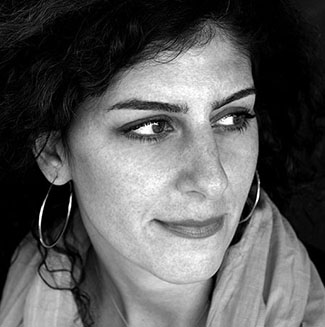
I had two roommates at the time and [that morning] we had an appointment at this place called Material for the Arts where they sell really cheap furniture to poor artists like us. It was in Long Island City [and] had a view of Manhattan.
When we arrived, the woman at the front desk was like, “Oh, my God, the tower! The World Trade Center is under attack!”
And we said, “What are you talking about?”
We thought she was kidding. We couldn’t even imagine that it would be real. We went to the window, and sure enough… It fell before our eyes.
Rachel Meeropol
I found out about what had happened before going into the office that morning. We all just started watching TV, and then we went into the office and we were watching TV there [too]. I didn’t understand what was going on. And then at a certain point, Bryan Stevenson, who was running the clinic was like, “Okay, turn the TVs off. We have to be prepared to go to death row tomorrow.”
So that was intense, especially because we were all from New York.
Debbie Almontaser
In the main office, an Arab Muslim parent came running in, crying. She basically said to us that people were harassing her outside as she walked over, and telling her to go back to her country.
She got into the building hysterical, [saying] “I’m afraid to go home, I’m afraid to take my kids out there.”
So the staff in the office calmed her down. I calmed her down. And then we found a male staff person who could walk her and her children home.
And that’s the moment when I was like, “Oh, my God, I’m standing here in a hijab. It might not be safe for me.”
Emily Jacir
I think one of the strongest memories I have of that day, and I will never forget this, was when [New York Senator Chuck] Schumer said, “These are Palestinians. This is what Palestinian mothers teach their kids to do.”
And it was on every single network in New York, and I’ll never forget that. It is just frozen in my mind forever, because it was so horrifying.
Of the five 9/11 plane hijackers, one was Egyptian and four were Saudi Arabian. None were Palestinian.
Mobilization
Debbie Almontaser
When we came back to school [after September 11], a lot of the [Arab and Muslim] families did not return and the school was calling to see what was going on. Everybody was either not answering their phone or just afraid to bring their children in.
I contacted people in my network and said, “Listen, I need you to come to the school. You speak Arabic, you speak Urdu, you speak Bengali — I need you to come to the school and speak to these families in their native language to reassure them that their children are going to be safe.”
Emira Habiby-Browne
Founder of the Arab American Family Support Center (AAFSC) , and founder and currently CEO of the Center for the Integration and Advancement of New Americans (CIANA)
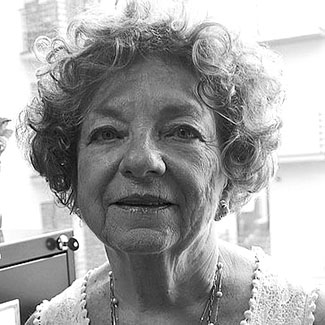
As you must know, we got a lot of threatening calls. It was a dangerous time, but we needed to do the work because there was nobody else to help the [Arab and Muslim] families. A lot of my staff left because they were scared, so I put out an SOS [for volunteer help] for one or two years. I had one staff person left. Wow, she was wonderful. And I can’t think of her name! She’s tall and slim, and oh, my God, what was her name? Emily, Emily, Emily. I can’t think of her last name.
Emira called me a week later when the name suddenly came to her — it was Emily Jacir.
Emily Jacir
I immediately set up and organized this massive volunteer program to get people to walk with women and children to school and back home, because I knew they were going to get attacked.
Debbie Almontaser
One night, as my husband and I were driving home down Coney Island Avenue, we saw unmarked cars and vans parked diagonally in the street. And then we saw like six South Asian men being frisked by these ununiformed [law enforcement agents]. We watched them get handcuffed and put into these vehicles. We drove another three blocks, and saw the same thing happening again a little closer to our house.
When we got home that night, my husband and I were just terrified and traumatized by what we saw. Our community was this beautiful, rich place bustling with people, beautiful dress, culture, the aroma of the food… And then to see this?
Rachel Meeropol
Immediately after 9/11, Arab, South Asian and Muslim men began disappearing off the streets of New York and New Jersey. It was happening across the country, but it was more focused in the New York/New Jersey area — That was sort of the locus of the detentions.
Debbie Almontaser
Literally, within days, people were calling me from the neighborhood saying, “My husband disappeared, my son disappeared. They went to work and they never came home.”
Emira Habiby-Browne
The families would say, “Where are our men? We don’t know where they are. We don’t know what to do.”
Rachel Meeropol
Initially, they [the lawyers] were just trying to find out where people were. People thought maybe their loved ones had died in the World Trade Center — they were just gone. We later came to understand that this was [the result of] a policy set at the highest level of government by then Attorney General John Ashcroft, working in concert with the director of the FBI at the time, Robert Mueller.
The FBI had set up a tip line right after 9/11, and thousands of tips were coming in from across the country. And Mueller directed that all of those tips be investigated, even if they were completely implausible on their face, things like “My neighbor is Arab and keeps strange hours. I think he might be a terrorist.”
Emily Jacir
It was just immediate, the [realization that] “Oh, my God, we are under attack.” And we have to find ways to protect these women and protect the children and protect these men being arrested out of their homes.
Rachel Meeropol
[The tips] would result in an FBI agent, an IRS agent, or an NYPD agent being dispatched to follow up, and if in the course of investigating, they encountered individuals who fit the profile of the hijackers who were in violation of the immigration law, they were arrested by virtue of that.
So folks who had overstayed their visa or were working without papers — you know, civil immigration violations — those individuals were all arrested and held in connection to the terrorism investigation, without any determination that they had any connection to 9/11. Some of the detainees were held in local jails and detention centers. But about 80 of them were placed in the Metropolitan Detention Center in Brooklyn.
Debbie Almontaser
We started organizing weekly demonstrations at the Brooklyn detention center on Third Avenue and 28th Street, and we named that project Justice for Detainees. So every Saturday, for six or eight months we were out there protesting, demanding the names and the charges of the people that they were holding.
Emira Habiby-Browne
“Tell us who’s in there so we can let their families know,” we’d say. “Just give us a name, so their family can know that they’re still around and where they are.”
Rachel Meeropol
They were placed in the most restrictive conditions of confinement that exist in the federal system: held in solitary confinement, unable to leave their cells ever except in handcuffs and shackles, with a waist chain and four guards around them. Strip searched, repeatedly kept from practicing their religion, mocked, beaten, kept from contacting the outside world, not provided medical care, not provided even hygiene items like toilet paper.
So, you know, just treated as if they were incredibly dangerous, suspected terrorists, when in reality, the only information that law enforcement had about them was their profile–their religion, their ethnicity, and their country of origin.
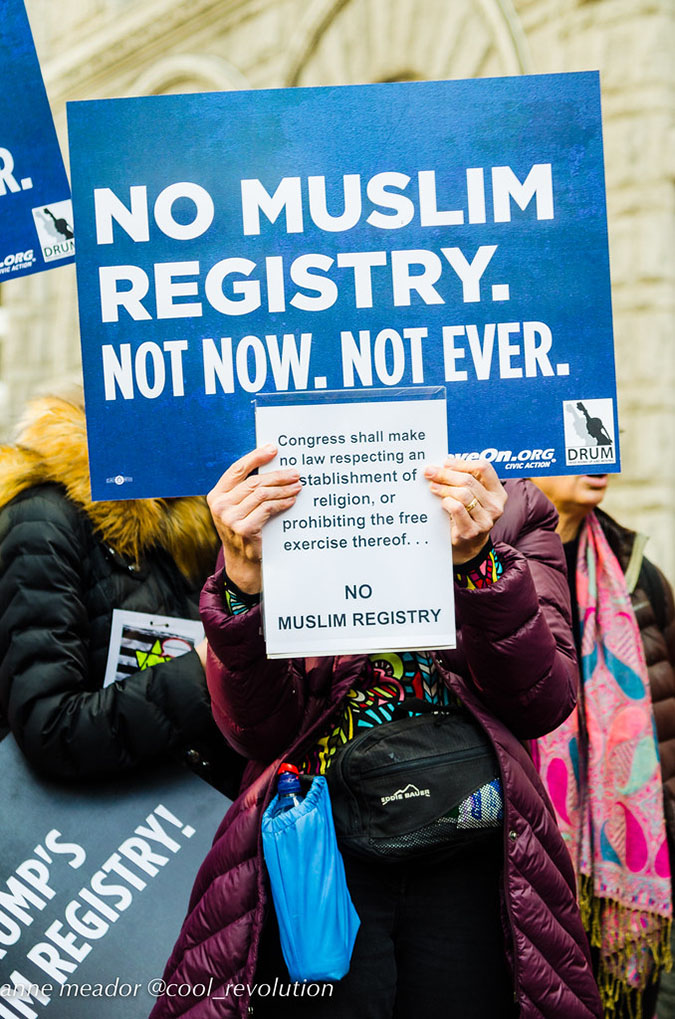
Emira Habiby-Browne
One of the worst events that I can remember was when all men between the ages of 15 and 35, had to go down and register at One Federal Plaza. We heard that they really needed legal help, so we brought in volunteer lawyers, and we would go down there every day to help translate and provide legal assistance.
Emira was referring to the Department of Homeland Security’s controversial National Security Entry-Exit Registration System (NSEERS), established in the wake of 9/11. The program required male noncitizens of a certain age, from a designated list of Muslim-majority countries, to “register” their presence in the country so that the federal government could monitor their activity within U.S. borders.
It’s seared into my heart, because it was the worst thing I’ve seen with respect to backlash. These men went down there [to the registration center] in good faith. Many of them didn’t speak English. DHS would take their passports or IDs or whatever they had at the door, and they were not allowed out after that. If they didn’t have all their papers together, or if they were undocumented in any way, they were at risk of being deported. And we knew that if they were sent up to the 10th floor, that meant that they were either going to be deported or sent to detention or God only knows.
Rachel Meeropol
Rachel defended a group of former detainees in the high-profile legal case Turkmen vs. Ashcroft. There were two groups of defendants in the case: the detention center guards and warden who allegedly abused the former detainees, and the high level government officials — Ashcroft and Mueller — on whose orders the immigration law was used to hold individuals on suspicion of terrorism. Some of the former-detainees settled with the U.S. government while a handful of others continued to pursue legal action. The Supreme Court dismissed the detainees’ case against Ashcroft and Mueller in 2016.
That decision [which] came in the first month of the Trump administration basically means that when high level federal officials set government policy, even if that policy violates clearly established constitutional rights, the victims of those policies probably can’t sue the individuals who are responsible for those violations. So that’s a pretty unfortunate precedent.
This is something I don’t think the general public or even most people in the legal profession understand: there is not a way to sue federal officials who violate the law the way you can sue state officials who violate the law.
The End of Arab America
Emira Habiby-Browne
When 9/11 happened, the American public did not understand who the Arab community was. They just saw us as terrorists, but they didn’t know the history. They didn’t know that we’ve been coming to this country for a very long time, that we have contributed a lot. It was a terrible, terrible thing that happened [on 9/11], but I felt that we had to make something good out of it. And that was to help the general population understand who we are as a people, understand that we come from over 20 different countries, different religions, different skin tones. And it was up to us as a community to do that.
Emily Jacir
What was happening in the [Arab-American] community before 9/11 was this massive, secular political movement. That day, it was totally destroyed. And I say this to people all the time — that was the day that Arab America died. Because after 9/11, it was subsumed under the category “Muslim-American,” which is a religious affiliation, and everybody was forced into that frame.
Emira Habiby-Browne
Americans didn’t understand the difference between a Muslim and an Arab. Meaning, to them, Arabs must be Muslims and Muslims couldn’t be non-Arabs.
Emily Jacir
Journalists would call the Arab American Family Support Center and say “We’re doing a photo shoot about Arab women” but they were only interested in photographing Arab women as long as they were in hijab. I could see what was happening. All this beautiful diversity in the Arab community was just eradicated instantly by the media.
I remember one time, I deliberately sent this photographer a bunch of blonde Arab women [to photograph]. Because, you know, God forbid, Arabs are diverse… That journalist was not pleased.
We Weren’t Allowed to Mourn
Debbie Almontaser
My son served for six to eight months [for the U.S. Army] at Ground Zero. And then he was discharged, but he came back a very changed person. He’s never been the same again. He has post-traumatic stress. He’s never dealt with what he saw and what he experienced. It’s been a struggle for him to fit back into society, to hold a job, to be functional.
One of his colleagues who was there [at Ground Zero], an oral historian who was taking pictures and documenting the site for the U.S. Army, sent my son some pictures of him there. I found them in his room once when I was cleaning up, and I just looked at some of those pictures, and I couldn’t believe that my child, my 18-year-old, witnessed all of this stuff. I eventually had a conversation with him about the pictures, and he said to me, “Mom, I still have dreams about being there and the body parts that I saw. I have dreams of finding fingers with rings on them, of a man’s neck where it was severed, a tie still hanging on it.”
Emily Jacir
A key part of the story too was that I had been part of the studio program in the World Trade Center on the 91st floor. I just remember sitting up there, staring out at New York from the 91st floor…
Emily had moved out of the studio the season before 9/11, but she was still affiliated with the artist residency program there. Her partner was on his way there to drop off his application the morning of September 11. Her friend, the artist Michael Richards, had spent the night of September 10 in the studio preparing for his upcoming show. He was killed in the attacks.
I lost a friend in that building. You know what I mean? That building was part of my life too, and many other people in the city. But after this catastrophic event, we became “them.” It was not an “us,” it was not a “we.” We were somehow pushed out of it.
Debbie Almontaser
It was devastating, because it’s not just my son. I have other family members that are in the military. Several of my nephews are in the U.S. Marines, and they actually served in Iraq and Afghanistan. There are many in my family who are police officers, there are many who are school teachers, like real public servants, and yet we were the public service that was not acknowledged and respected [after 9/11], unfortunately, because of the backlash and discrimination that Arabs and Muslims faced back then.
Emily Jacir
I think part of the reason it’s hard to talk about it is because it hurts. I mean, it hurts to have lost this really special moment, culturally and politically, for Arabs in America that was destroyed that day. But the other thing that really hurts too is that we weren’t allowed to mourn. We were not part of the mourning process at all, we were not considered part of the city, part of the population, part of the people that were affected.
Where Are We Going?
Debbie Almontaser
In the aftermath, there was the backlash and discrimination, but one of the things that did not really get highlighted as much was the solidarity that took place. All of these coalitions that formed and the escorting system that was established. The posters that were being held in defense of Arabs and Muslims and South Asians who were wrongfully detained. It was just one of the most beautiful times that I had experienced [and it] gave me hope to see us turning a milestone.
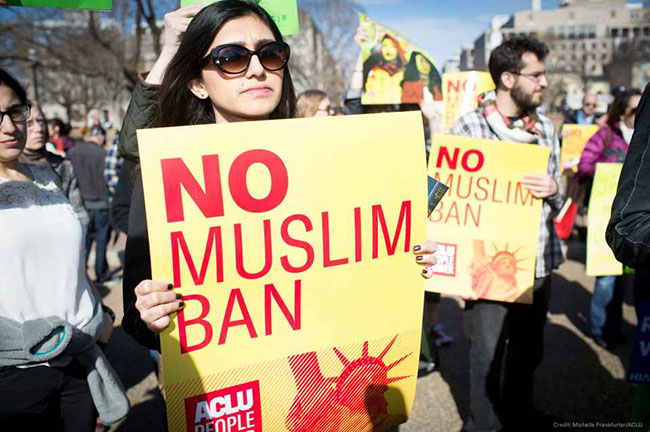
Emira Habiby-Browne
In that respect, it did start to get better after 9/11. It got better and better. So I was encouraged, and I felt good. Then [in 2016] it all started to go downhill again. And that was very traumatic for me, because I felt like we had gone so far. There was a lot of progress. We had done a lot of work, and we were seeing the results of that.
And then everything went crazy again [with] the banning of anybody coming from Muslim countries and all these other policies. And I tell you, I’ve been very depressed. Because I felt like it was another 9/11, you know? And we had to start from scratch again.
Rachel Meeropol
History is repeating itself. At the time of the detentions, it felt to some of us that, of course, this will [someday] be recognized as illegal and discriminatory. Look at how history judges Japanese internment, you know? We now see that as wrong.
There’s widespread public acceptance that law enforcement based on profiling and group membership is unconstitutional, is immoral, is also ineffective. That this is not the way this country operates. But, in fact, the law that developed after 9/11 brings us to the opposite place, to show us that we still are this country. These men have been struggling for accountability for 20 years and still don’t have it.
And actually, instead, what happened is the Supreme Court basically let federal officials know that they can violate the Constitution with impunity, without concern that they will be held personally accountable. And what happened? Well, the Trump administration happened, and we are still here. The courts could function as important checks on executive illegality, but they do not. And they will not until Congress acts to correct what the Supreme Court did.
Emily Jacir
I agreed to talk to you about this because I know, and not just believe, that our histories as Arabs are often erased and eradicated. And I do think that it’s important that younger generations have access to first-hand accounts of what was happening in the community, not only on that day, but why many of us left [New York] afterwards.
Rachel Meeropol
On September 9, 2021, two days before the 20th anniversary of 9/11, District Court Judge Dora Irizarry dismissed the initial complaints brought against the detention center guards and warden for enabling the abuse of the former detainees. In doing so, the judge effectively ruled that individuals beaten in detention by federal employees cannot sue the warden and others who allowed and facilitated that abuse. The following is a statement by Rachel on the day of the decision:
Today’s ruling sends a grim message to people in detention centers and prisons across the country that their abusers will face no consequences. Until this country ensures that federal officials will be personally held accountable for their violations of the Constitution, we are neither safe nor free.
Emira Habiby-Browne
Right now, I have a big question mark. Like, ok, where are we going? What are we doing? How are we going to cope with so many issues here and all over the world?
People come here because they want to make a better life for themselves. That’s their hope. They want to succeed, they want to contribute. They want their children to do well. But with this negative environment that we’ve had, how can these kids do it?
So much discrimination and hate crimes and hostility… Are we going to actually overcome this? Or are we going to succumb to it?
I don’t have an answer. I’m waiting. I’m waiting to see.

